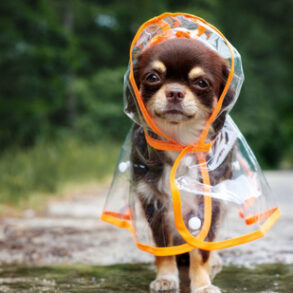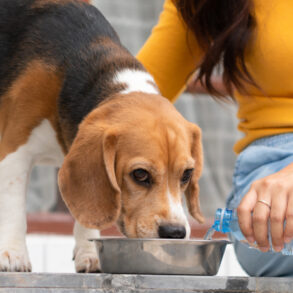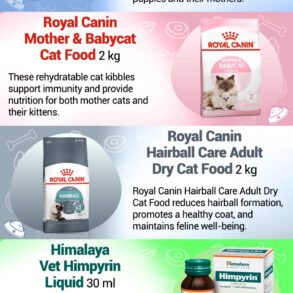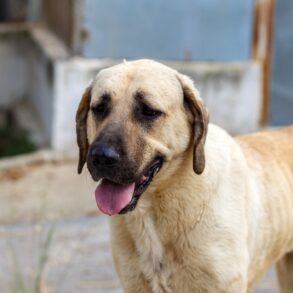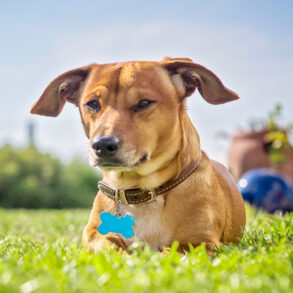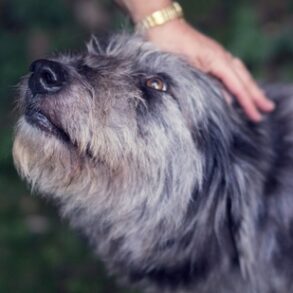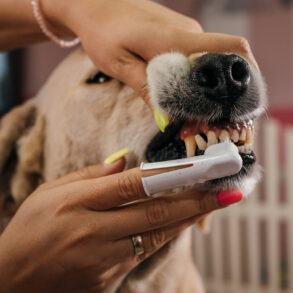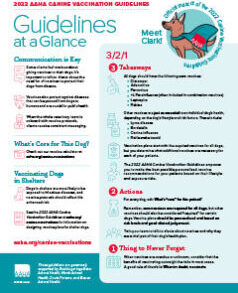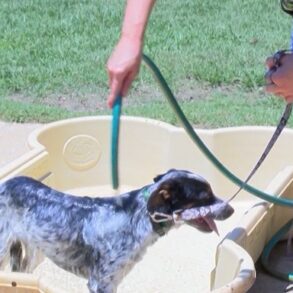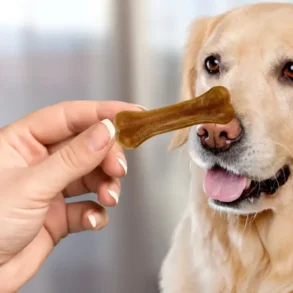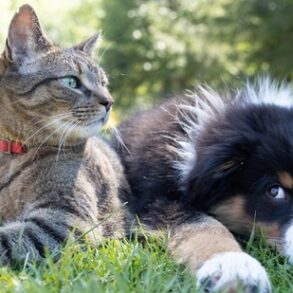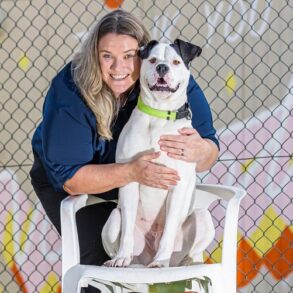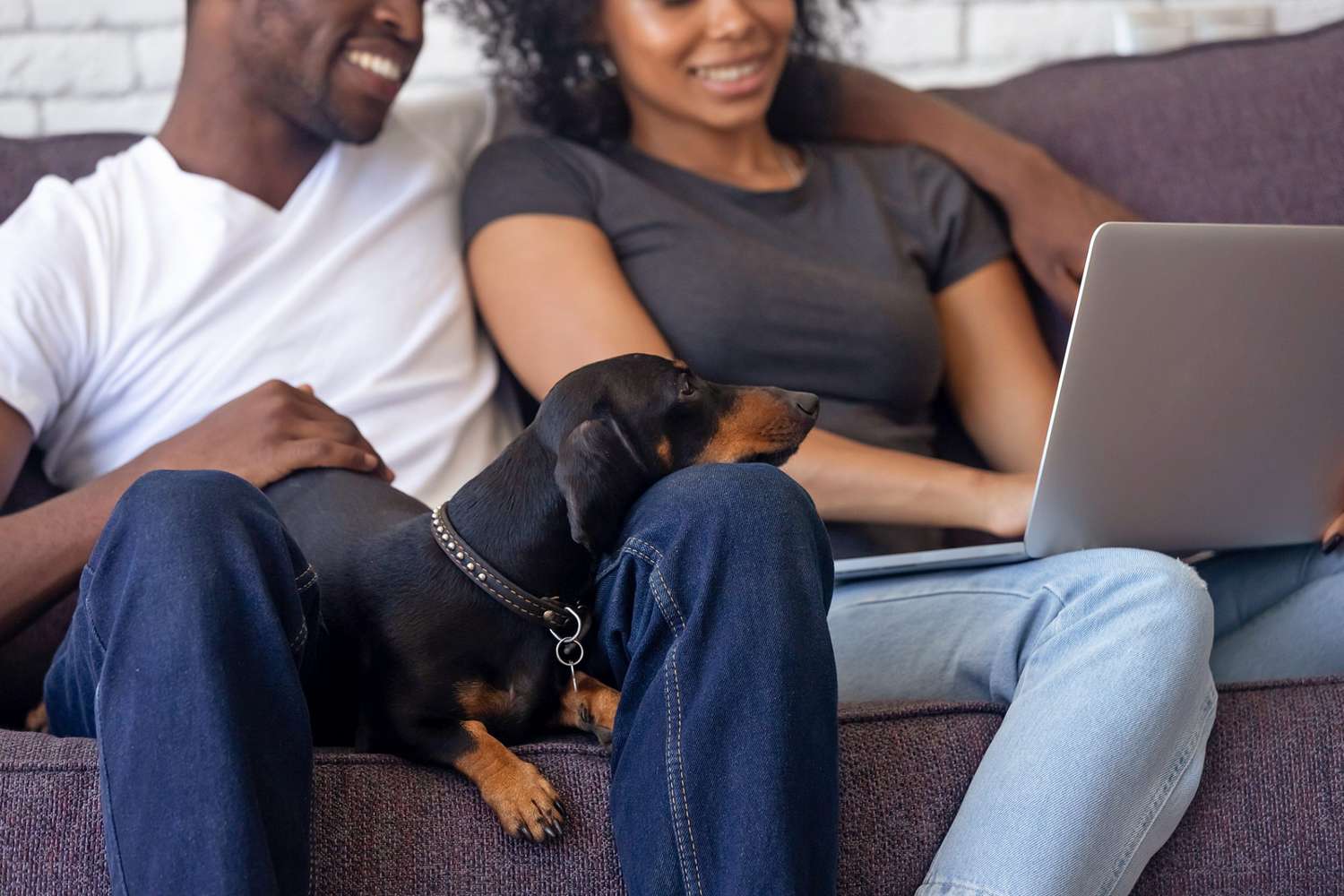
If you’ve ever been up all night tossing and turning, you’ve probably tried using melatonin to help you sleep. And if it has worked for you, you might wonder if melatonin can be given to dogs. The answer is yes—most dogs can have melatonin and some even benefit from it.
But it’s not just for sleep. Melatonin has a few different uses in veterinary medicine. It can help with anxiety and hair loss and calm dogs before surgery. It’s important to understand the side effects, though, and the correct dosage of melatonin for dogs. Here’s what to know if your veterinarian suggests it for your pup.
What is Melatonin?
Melatonin is a naturally occurring hormone in many animals, including dogs, cats, and humans. It’s primarily produced by the pineal gland in the brain and helps regulate your body’s circadian rhythm. Melatonin production is stimulated by darkness, so levels are significantly higher at night than they are during the day.
In dogs and many other animals, melatonin impacts several aspects, including reproduction, behavior, and hair growth (including seasonal shedding).
Melatonin Uses For Dogs
Melatonin supplements are considered safe for use in most dogs. Veterinarians may recommend melatonin for a variety of cases, including:
- Hair loss: Melatonin has been shown to promote hair regrowth in dogs with alopecia (hair loss) related to non-allergic skin conditions such as generalized alopecia, atopic dermatitis, alopecia X, seasonal flank alopecia, and mange.
- Anxiety: Because melatonin has a calming effect, it has been used to treat dogs with generalized anxiety, separation anxiety, and phobias.
- Sleep: Just like with people, melatonin can help dogs sleep better. Dogs can experience sleep disturbances due to sleep disorders such as narcolepsy or as a symptom of a health problem. Dementia can also disrupt dogs’ sleep-wake cycles.
- Surgery: Research has shown that giving melatonin prior to anesthesia can promote calmness and reduce the amount of anesthesia drugs needed.
Veterinarians continue to study the effects of melatonin on animals and its potential benefits. Talk to your vet if you think melatonin could benefit your dog.
Melatonin Side Effects in Dogs
The good news is that melatonin is considered quite safe for dogs, with side effects being quite rare. The primary side effect is sleepiness. Melatonin can also cause changes in fertility in dogs that have not been spayed or neutered. Other potential side effects include GI upset, increased heart rate, itching, and confusion.
Melatonin Dosage for Dogs
Melatonin has a wide dosage range for dogs, just like for humans. The recommended dose depends on the reason for treatment. General recommendations are to give one to six milligrams orally every eight to 24 hours, with the exact dosage largely dependent on your dog’s weight. Typically, doses are lower and less frequent when used as a sleep aid rather than for skin conditions and behavioral concerns. Your veterinarian will determine the dosage that is most appropriate for your dog.
Melatonin is usually given orally as a pill, chewable, or liquid. Oral melatonin for both dogs and humans is available over the counter and can be given with or without food. When shopping for melatonin for your dog, keep in mind the composition of commercial melatonin products varies widely. Many of the tested products had melatonin levels that differed from what was listed on the label, and some even contained serotonin. When in doubt, your vet can help you find the best product for your dog.
There’s also a melatonin implant called Dermatonin that is available in some areas of the U.S.. This implant is injected under the skin and provides continuous melatonin treatment for up to six months.
No matter the dose, melatonin works quickly, taking effect within one to two hours. And if you happen to miss a dose, you can still administer it, so long as it’s not too close to the next scheduled dose. If it’s nearly time for your dog’s next dose of melatonin, then skip the missed dose, and proceed with the regularly scheduled dose. Do not double up on doses.
Can Dogs Overdose on Melatonin?
Little evidence exists regarding dogs overdosing on melatonin. Fortunately, melatonin has a wide dosage range, so a mild overdose is unlikely to cause significant problems, but mild overdoses of melatonin may cause vomiting, diarrhea, and excessive sleepiness.
A major overdose of melatonin might be more serious. Potential effects include incoordination, itchiness, high blood pressure, rapid heart rate, and seizures. Contact a veterinarian immediately if your dog consumes a large amount of melatonin (like a whole bottle). You can call your local vet, a pet emergency center, or a pet poison control service like ASPCA Animal Poison Control at (888) 426-4435 or Pet Poison Helpline at (855) 764-7661. You may be advised to induce vomiting if the overdose happened recently. Your dog will likely require follow-up treatment at a veterinary hospital.
Can Dogs Have Human Melatonin Gummies?
The answer here is a big maybe. Some human-labeled products contain ingredients that are harmful to dogs, particularly the sugar substitute xylitol. It’s best to choose a product labeled for use in dogs. Check the labels and ask your vet which ingredients are safe. Immediately contact your vet or a poison control service if your dog eats melatonin gummies that contain xylitol.
Melatonin Drug Interactions and Warnings
Melatonin is considered safe to use with most other drugs. However, it may increase the effects of benzodiazepines like diazepam and alprazolam. Melatonin can also increase the effects of succinylcholine, a skeletal muscle relaxant. In addition, melatonin may not react well with certain vitamin and herbal supplements. Be sure to tell your vet about all of your dog’s medications and supplements before starting melatonin.
This post was originally published on this site be sure to check out more of their content.








